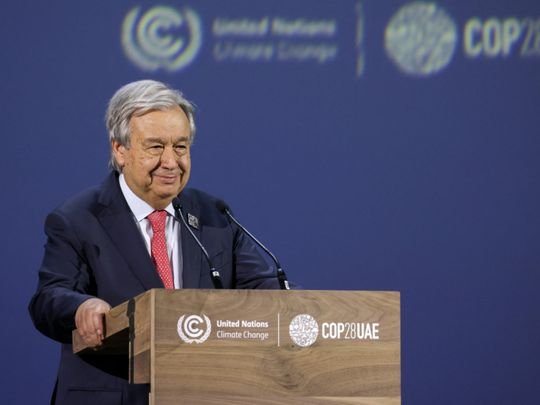UN Secretary-General Antonio Guterres has called on world leaders to envision a future without fossil fuels as the only viable solution to curb global warming.

In a pivotal moment at the COP28 climate summit in Dubai, UN Secretary-General Antonio Guterres has called on world leaders to envision a future without fossil fuels as the only viable solution to curb global warming. Guterres’s statement comes in contrast to the proposal put forth by COP28 President Sultan Ahmed al-Jaber, advocating for the continued use of fossil fuels.
Addressing the assembly just a day after Ahmed al-Jaber’s proposal, Guterres emphasized, “We cannot save a burning planet with a fire hose of fossil fuels.” The UN Secretary-General stressed that achieving the 1.5-degree limit, crucial for mitigating the impacts of climate change, requires a complete cessation of burning all fossil fuels, not merely reduction or abatement.
The divergent visions presented by Guterres and Ahmed al-Jaber underscore the challenges and divisions prevailing at the climate talks hosted in the oil-producing United Arab Emirates. The summit has been marked by discord over fossil fuel usage, disputes related to financing, and geopolitical tensions linked to the conflict in Gaza, all of which threaten to impede progress in the negotiations.
Despite the discord, a significant development emerged with the agreement reached on Thursday to establish a “loss and damage fund.”
The fund aims to assist economically disadvantaged nations in coping with the consequences of climate change, largely attributed to the historical use of fossil fuels by wealthier countries. However, only $700 million has been allocated to the fund, falling short of the $100 billion sought by developing nations.
Adding to the challenges, reports surfaced of the host nation, the United Arab Emirates, potentially seeking commercial deals on additional oil and gas production during the summit. This led to the resignation of a member from a developing nation on the summit’s main advisory board, Hilda Heine of the Marshall Islands, who expressed concerns about actions undermining the integrity of the COP presidency and the negotiation process.
COP28 has also witnessed unexpected political interventions, with some world leaders deviating from the norm of avoiding political discussions at UN climate summits. Turkish President Recep Tayyip Erdogan and South African President Cyril Ramaphosa openly criticized Israel’s bombardment of Gaza during their speeches, accusing Israel of committing war crimes.
Israeli President Isaac Herzog, scheduled to speak, did not do so in response to the criticisms, highlighting the heightened emotions and geopolitical complexities overshadowing the climate negotiations.
In the midst of these challenges, Guterres reminded delegates of the primary purpose of their gathering, stating, “We are here all together, all the world together, to combat climate change.” The juxtaposition of urgent climate concerns with geopolitical conflicts underscores the intricate balance that global leaders must navigate in addressing the pressing issues of our time.
As the COP28 summit progresses, the world waits to see if leaders can overcome the divisions, prioritize environmental sustainability, and forge agreements that pave the way for a greener and more resilient future.